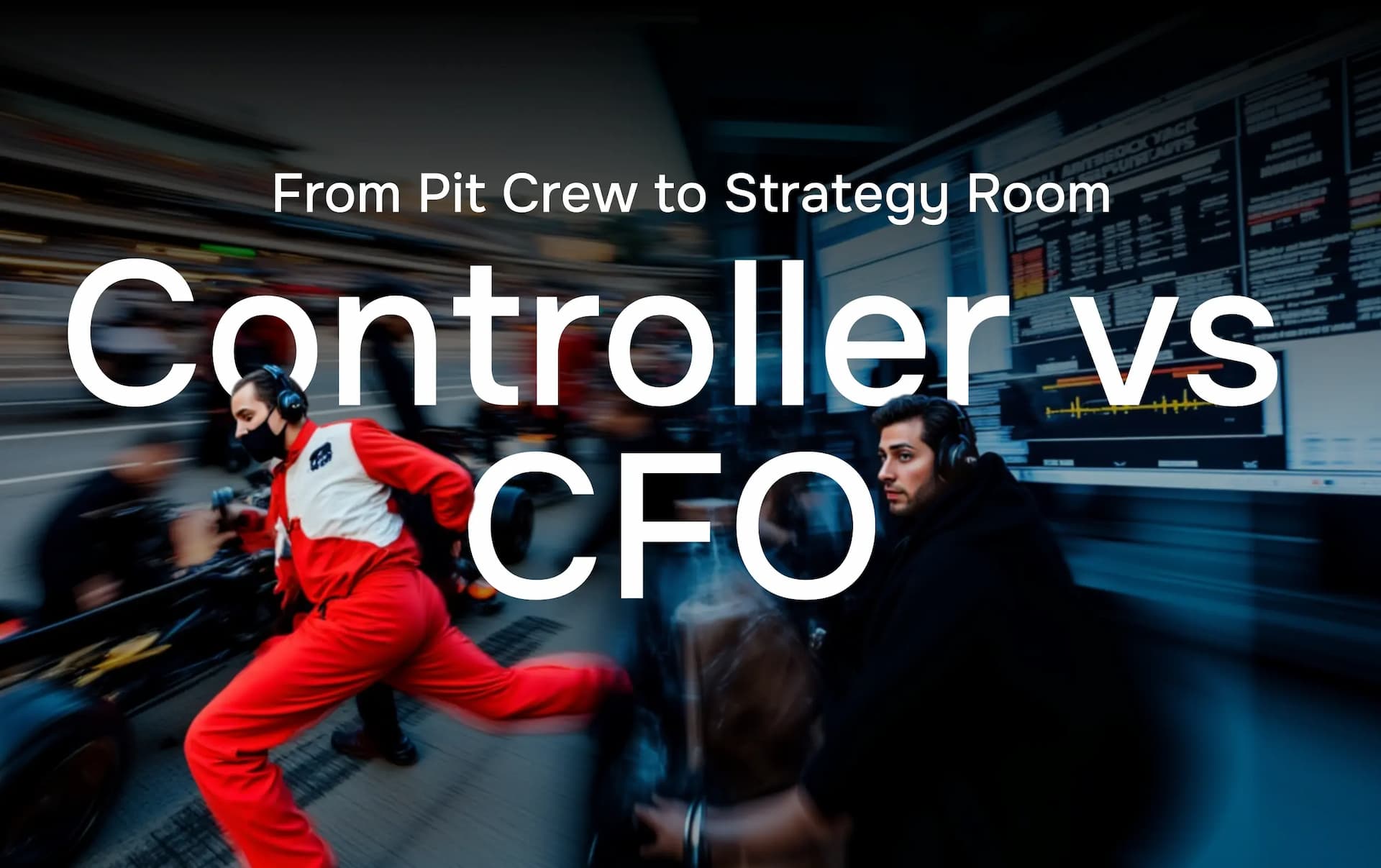
Controller vs CFO: Breaking Down the Roles and Finding the Right Fit for Your Business
Published on:
If you’ve been in business long enough, you’ve probably heard these two titles tossed around like they’re interchangeable: Financial Controller and Chief Financial Officer (CFO).
But here’s the thing they’re not the same.
Sure, they both swim in the same financial pool, but one’s doing laps in the deep end while the other is steering the whole ship from the captain’s chair.
Think of it like this, if your business was a professional sports team, the controller would be the scorekeeper, making sure every point, stat, and rule is recorded with laser accuracy. The CFO? That’s your head coach, deciding the game plan, calling the plays, and figuring out how to win the championship.
Let’s break it down, explore what each role really does, and figure out whether your business needs a CFO, a controller, or both.
First Things First: What’s a Controller?
A controller (sometimes called a comptroller in government or nonprofits) is your company’s financial perfectionist.
They make sure your numbers aren’t just close, they’re dead-on accurate. Every invoice, payroll run, bank reconciliation, and financial report. Yep, they’ve got their fingerprints on it.
In small businesses, a controller might be the finance department, overseeing bookkeepers, reviewing journal entries, and making sure everything lines up with GAAP (Generally Accepted Accounting Principles). In bigger companies, they manage a whole accounting team and report to the CFO.
A day in the life of a controller might include:
• Making sure accounts payable and accounts receivable are in check.
• Closing the books each month on time and without nasty surprises.
• Keeping internal controls tight so fraud doesn’t sneak in.
• Coordinating with auditors.
• Approving invoices and monitoring cash flow.
The controller is like the pit crew in Formula 1 racing, they’re not deciding which race to enter or how aggressive to be on the turns, but they make sure the car is tuned, fueled, and race ready. Without them, your whole strategy falls apart before you hit the track.
What About the CFO?
Now let’s talk about the Chief Financial Officer, your big-picture strategist.
The CFO is the highest financial executive in the company. If the controller is focused on yesterday and today, the CFO is thinking about tomorrow and five years from now. They handle financial strategy, capital structure, investments, and sometimes even technology or operations.
In public companies, they also lead quarterly earnings calls and talk to shareholders, analysts, and the press. In private companies, they might spend more time with investors, banks, and strategic partners.
CFO responsibilities often include:
• Advising the CEO and board on financial strategy.
• Forecasting revenue, profits, and cash flow.
• Overseeing mergers, acquisitions, or expansions.
• Managing relationships with banks and investors.
• Identifying growth opportunities (and avoiding financial landmines).
• Leading risk management efforts from insurance to cybersecurity.
If the controller is the pit crew, the CFO is the race strategist in the control room, watching the weather, analyzing competitors, and deciding when to make a pit stop for maximum advantage.
Controller vs CFO: Six Key Differences
While they work closely together, their mindsets, skill sets, and goals are different. Here’s a quick side-by-side difference you can picture:

In short, the controller makes sure the numbers are accurate, and the CFO uses those numbers to steer the business forward.
Why Smaller Businesses Often Pick One
Here’s the reality, smaller companies (especially startups and businesses under $10M in revenue) usually choose one of these roles, not both.
Why? Labor costs. As these are senior, well-paid positions, and unless you’ve got the budget and complexity to justify it, you don’t hire both.
A $3M business with a simple product line might get along fine with a strong controller (or even an outsourced controller service) and a CEO who handles the strategic side. On the flip side, a startup seeking venture funding might skip a controller and bring in a fractional CFO to help land investors and design a growth plan.
When You Probably Need a Controller
• You’re doing over $5M in annual revenue.
• Month-end close drags on forever, and no one’s really owning the process.
• Your investors or lenders want GAAP-compliant financial statements.
• You’ve had a few too many “wait… did we pay that twice?” moments.
• Your financial processes are manual and need better controls to prevent fraud or errors.
When You Probably Need a CFO
• You’re approaching $25M+ in revenue or growing so fast you’ll get there soon.
• You’re thinking about selling the company, buying another, or going public.
• You’re entering new markets (especially international).
• You’re raising capital or negotiating with investors.
• You need serious forecasting and scenario planning to make big moves.
Can One Person Do Both Jobs?
In many small to mid-sized companies, yes, they have to. But here’s the catch: doing both well is like being both the quarterback and the referee in the same game. You can try, but sooner or later you’ll be too busy calling the plays to notice a flag on the field.
That’s why so many businesses use a blended approach, outsourcing a controller and a fractional CFO. You get both skill sets, full coverage of your finances and your strategy, all for less than the cost of hiring one full-time executive.
The Paycheck Reality
It probably won’t surprise you that CFOs generally earn more than controllers, the role covers a broader scope, carries higher responsibility, and often includes external representation of the company.
If you’re curious about current compensation trends, ZipRecruiter has up-to-date data on CFO earnings and controller salary. Just remember compensation isn’t only about base pay; benefits, bonuses, profit-sharing, and equity can play a big part in the total package.
How Technology Has Changed Both Roles
Long gone are the days of leather-bound ledgers and manual adding machines. Today, both CFOs and controllers rely on financial management systems like NetSuite, QuickBooks Enterprise, or Sage Intacct to handle:
• Automated billing & invoicing
• Real-time dashboards
• Compliance tracking
• Budgeting and forecasting tools
For controllers, tech means faster closes and fewer errors. For CFOs, it means better data for smarter decisions.
The Bottom Line
Here’s the simplest way to remember it:
• Controller = Past & Present → Keeps the numbers right.
• CFO = Present & Future → Uses the numbers to drive growth.
If you’re a small company, you might start with one. As you grow, you’ll eventually need both whether in-house or outsourced to keep your finances in check and your strategy sharp.

Shekhar Mehrotra
Founder and Chief Executive Officer
Shekhar Mehrotra, a Chartered Accountant with over 12 years of experience, has been a leader in finance, tax, and accounting. He has advised clients across sectors like infrastructure, IT, and pharmaceuticals, providing expertise in management, direct and indirect taxes, audits, and compliance. As a 360-degree virtual CFO, Shekhar has streamlined accounting processes and managed cash flow to ensure businesses remain tax and regulatory compliant.
You might also like:
Listen Exclusive Podcast On

